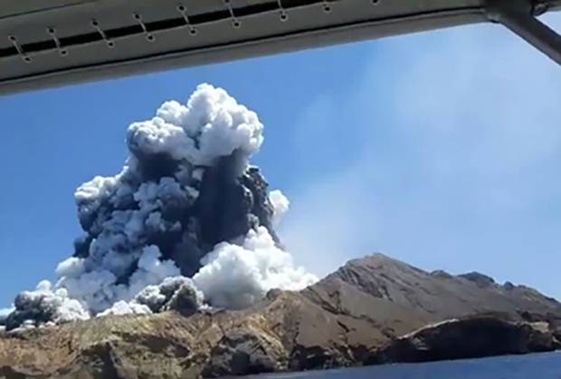
A volcanologist has described the quick-fire type of eruption at White Island today as "basically instantaneous".
"One minute nothing's happening, next minute, it's all happening," GNS Science's Brad Scott said.
At about 2.11pm, the eruption fired a plume of ash 3.6km above the vent of the offshore Bay of Plenty volcano.
The island's crater floor was littered with ash, which continued to fall on the island - but only a minor amount of the material was expected to reach the East Cape over the next few hours.
Scott said it would be difficult what happened next at the famously active volcano, which was now officially in an eruptive episode.
/arc-anglerfish-syd-prod-nzme.s3.amazonaws.com/public/M6IHI24AUVFZDCHUE3OOXXAP7M.jpg?width=489&height=652&mode=max)
White Island erupting about 2.15pm today. Photo / Jon Arrieta
"After a period of unrest, there's always the likelihood of further eruption – and there's a lot of uncertainty about that."
Scott explained that, once a volcano moved into this state, eruptive activity became harder to predict than when it was in unrest.
Scientists would be keeping a close eye on monitoring parameters, he said.
And White Island's unrest had been well-flagged: ahead of the eruption, authorities raised its Volcanic Alert Level to Level 2, as scientists observed increasing amounts of sulphur dioxide gas - a key indicator of rising magma deep in its bowels.
University of Auckland volcanologist Shane Cronin added that sudden unheralded eruptions from volcanoes such as White Island could be expected at any time.
"Magma is close to the surface, and the heat and gases from this heat the surface and ground waters to form vigorous hydrothermal systems," he said.
"We know hydrothermal and so-called phreatic eruptions can occur suddenly and with little or no warning because they are driven by the expansion of super-heated water into steam."
Cronin said hazards expected from such events are the violent ejection of hot blocks and ash, and formation of hurricane-like currents of wet ash and coarse particles that radiated from the explosion vent.
"These can be deadly in terms of causing impact trauma, burns and respiratory problems," he said.
"The eruptions are short-lived, but once one occurs, there are high chances for further, generally smaller ones as the system re-equilibrates."
Scott added that, just because there was an eruption at one volcano, that didn't mean the risk was higher at any others in the Taupo Volcanic Zone.
"Each volcano is an individual and what one volcano does has little or no relationship to other volcanoes," he said.
"You could say that, while they're all connected up to the same water supply, if one house has a problem with its hot water cylinder, it's got nothing to do with one next door."
Authorities have now moved the volcano's Alert Level down from 4 to 3.
Take your Radio, Podcasts and Music with you









